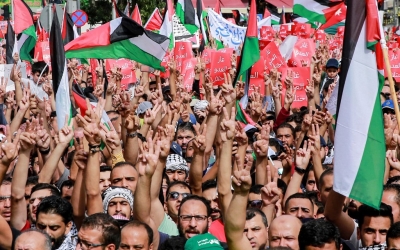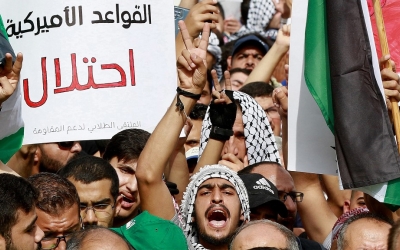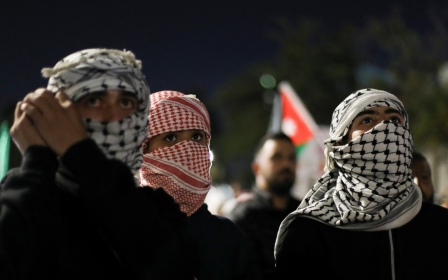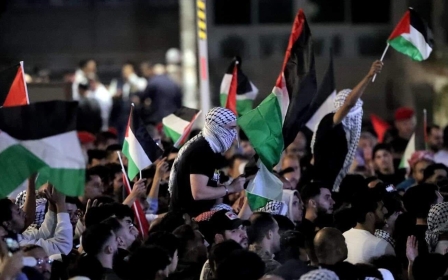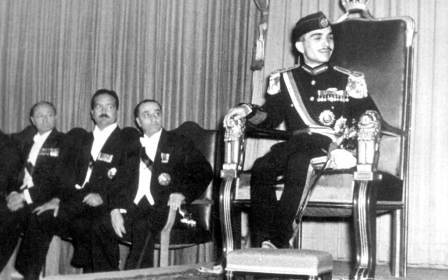Israel-Palestine war: Why Gaza genocide is seen as an existential threat to Jordan
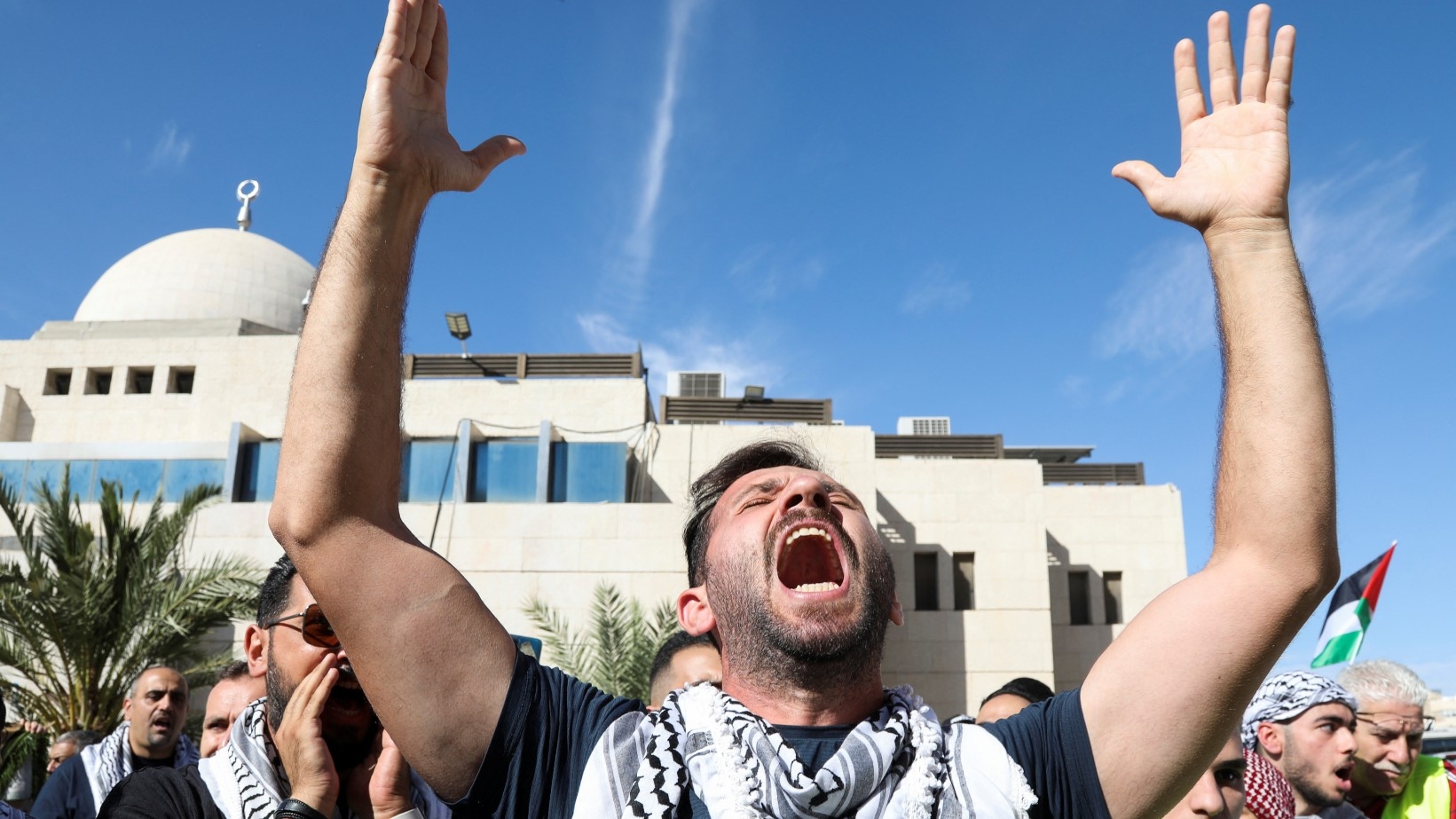
In an unusual alignment, both the Jordanian royal court and government are in accord with their citizens’ sentiment and recognise the unfolding Israeli genocide in Gaza as a threat to the very existence of Jordan.
This threat has deeper ideological and eschatological foundations rooted in Revisionist Zionism, which regards Jordan as part of “greater Israel”, and which informs the current political atmosphere in Israel.
Israel has perceived Jordan through typical settler-colonial frontier logic, whereby Jordan has been approached as a functional colonial space rather than a sovereign state.
Notably, not only Palestine but also Jordan is perceived through a biblical lens as the “Land of Gilead”, with Jordan being purported as an integral part of “greater Israel”. This perspective has gained such prominence that it found expression in popular song lyrics, such as “Two Banks has the Jordan [River] - This is ours and that is as well”, from a song titled The East Bank of the Jordan penned in 1929 by Vladimir Jabotinsky, a Ukrainian Jewish leader of Revisionist Zionism.
Leaders of various Zionist stands deemed the British exclusion of Transjordan from the purview of the colonial promise to establish a Jewish homeland in Palestine as a “serious whittling down of the Balfour Declaration”, as Chaim Weizmann noted in his memoir.
Despite their objection to this exclusion, pragmatic leaders within the Zionist movement continued to view Jordan as a vital security buffer and frontier space, where they contemplated transferring - that is ethnically cleansing - the indigenous people of Palestine to neighbouring countries.
Today, more than two million Palestinian refugees reside in Jordan as a result of the ongoing ethnic cleansing since the Nakba, the mass expulsion in 1948.
Revitalised Revisionist Zionism
Since the 1930s, the Hashemites have attempted to navigate and counter this threat through various strategies, including collusion with Zionism, maintaining clandestine relations with Israel, forming alliances with Britain, and later the United States.
This complex geopolitical balancing act eventually culminated in the signing of the Wadi Araba Jordan-Israel peace treaty in 1994, shortly after the PLO recognised Israel.
Follow Middle East Eye's live coverage for all the latest on the Israel-Palestine war
The Oslo peace process and its supposed two-state solution, aiming for a Palestinian state in the West Bank and the Gaza Strip, appeared to provide a semblance of security for Jordan. From a Jordanian perspective, the two-state solution would officially delineate the limits of the Israeli colonial expansion, thereby removing the risk of the West Bank being annexed and the demographic engineering and ethnic cleansing that could ensue.
This logic has prevailed in Jordan for the past three decades, during which official Jordan has repeatedly disregarded the sentiment of its citizens and entered into 15 deeply unpopular agreements with Israel, including the Wadi Araba treaty.
This approach was abruptly shattered in the summer of 2020 when Israel was on the verge of formally annexing the de facto annexed West Bank. Since then, Jordanian-Israeli political relations have been stumbling from one diplomatic row to another.
Despite the suspension of the formal annexation plan, calls for ethnic cleansing and the transfer of Palestinians to Jordan have gained prominence within the Israeli mainstream political spectrum.
Israeli messianic far-right movements, currently predominant in the political scene, have revitalised the geographic and demographic vision of the mapping of Revisionist Zionism.
For instance, in March 2023, Bezalel Smotrich, the Israeli finance minister and a settler of Ukrainian descent residing in an illegal settlement in the West Bank, articulated this vision. He denied the existence of the Palestinian people while standing at a podium displaying a map portraying Jordan as part of “greater Israel”.
Jordan swiftly condemned this act as reckless, racist and a violation of international law and the Jordanian-Israeli peace treaty.
Paradoxically, official Jordan persisted in deepening its dependence on Israel, especially in critical sectors such as energy and water. This approach elicited considerable apprehension among the Jordanian public.
In fact, Jordan had been poised to sign a water-for-energy deal with Israel in Dubai in November. However, in response to the unfolding Israeli genocidal practices in the Gaza Strip, Jordan’s foreign minister vowed “We will not sign this agreement any longer.” Furthermore, the Jordanian parliament unanimously endorsed a motion to review its bilateral treaties with Israel.
Declaration of war
Jordan’s strained relationship with Israel had been deteriorating well before 7 October, primarily because of simmering threats beneath the surface.
In the West Bank, armed Jewish settlers have been regularly terrorising defenceless Palestinians, thus adding to the systematic Israeli settlement expansions, land expropriation, apartheid, house demolition, hostage-taking (“arrests”), killings and raids on Palestinian towns and refugee camps.
In Jerusalem, Jordan’s custodial role over Muslim and Christian holy sites, a crucial source of legitimacy for the Hashemite regime, has been facing consistent challenges. Jewish extremists and government officials have frequently stormed and desecrated these sites in preparation for a potential division of the al-Aqsa mosque between Muslims and Jews, just like the situation at the Ibrahimi Mosque in Hebron.
From Jordan’s perspective, the Israeli stated goal of erasing Hamas increases the likelihood, if not inevitability, of a regional war
Amid escalating violence and pogroms, the Palestinian Authority’s reluctance to protect Palestinians, coupled with the recent provision of additional firearms to Jewish settlers in the West Bank, has heightened Jordan’s fears of another Nakba.
Jordan’s sense of insecurity is growing each day, particularly in the wake of its unsuccessful diplomatic efforts and the failure of the Joint Arab-Islamic Extraordinary Summit (held in November) to halt the Israeli wholesale onslaught on Gaza, which Jordan considers a genocide by legal standards.
Jordan’s American and European allies have paid little attention to its interests and pleas for a ceasefire. This crisis has laid bare the limited diplomatic influence of Jordan, revealing that this “alliance” is essentially a clientelist and neocolonial relationship.
The threats have not only become credible but have also evolved into imminent ones, prompting Jordan to clearly delineate its red line: ethnic cleansing in the West Bank or Gaza as “a declaration of war” against the Hashemite Kingdom of Jordan.
Turning point
The inability of Jordanian diplomatic efforts to facilitate a ceasefire in Gaza has highlighted the inadequacy of the prevailing logic of the past three decades, underscoring a compelling necessity for a shift in direction.
Compared to other Arab regimes, Jordan has made several critical decisions, such as reviewing previous agreements with Israel, cancelling planned ones, withdrawing from a meeting with US President Joe Biden, mobilisation of the Jordanian army along the western borders, the expulsion of the Israeli ambassador in Amman, and the deployment of field hospitals.
These actions signal Amman’s preparation for confronting Israeli threats alone, especially in the event of a regional war.
From Jordan’s perspective, the Israeli stated goal of erasing Hamas increases the likelihood, if not inevitability, of a regional war.
While the official stance of Jordan does not support Hamas or other resistance movements, it recognises the significance of Hamas as an essential component of the “idea” of resistance deeply ingrained in Palestinian society and its struggle.
Consequently, Israeli efforts to dismantle Hamas imply also destroying the very fabric of Palestinian society and its civilian infrastructure. In turn, this could contribute to demographic engineering and the mass expulsion of Palestinians to Jordan and other countries.
Furthermore, Jordan finds itself surrounded by regional actors in Lebanon, Iraq, Syria and Yemen, which have escalated their attacks on Israeli and American targets. Further, Hezbollah has explicitly declared its commitment to throw its weight behind ensuring a “Hamas victory in Gaza” when needed.
Given its strategic location and the long borders it shares with Israel, along with American bases on its soil, Jordan is deeply apprehensive about the possibility of being ensnared in the crossfire.
Jordan is acutely attuned to the existential threats posed by the impending spectre of a regional war, ethnic cleansing, the resurgence of biblical eschatology and the pursuit of “greater Israel”. These threats stem from Israel’s entanglement in a settler-colonial frontier struggle, wherein Jordan serves as a colonial space to dominate and into which to drive the indigenous people of Palestine.
This grim reality displays the futility of seeking stability or peace with a settler-colonial state and society, necessitating a departure from conventional approaches that have consistently proven futile.
The views expressed in this article belong to the author and do not necessarily reflect the editorial policy of Middle East Eye.
Middle East Eye propose une couverture et une analyse indépendantes et incomparables du Moyen-Orient, de l’Afrique du Nord et d’autres régions du monde. Pour en savoir plus sur la reprise de ce contenu et les frais qui s’appliquent, veuillez remplir ce formulaire [en anglais]. Pour en savoir plus sur MEE, cliquez ici [en anglais].



